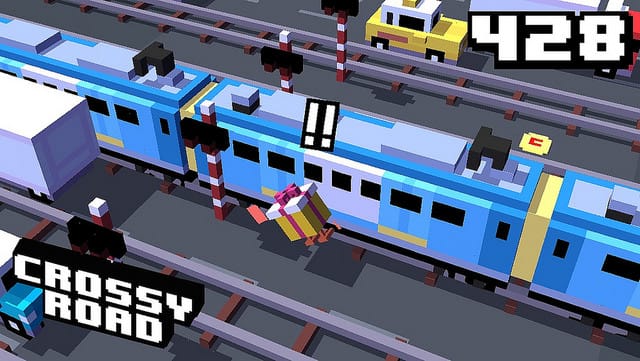These Guys Built an App That Earned $10 Million in 90 Days. Here’s How

Matt Hall first began developing video games when he was just eight years old, creating them on his old Commodore 64. Now, he’s 39 years old and one of the co-developers of Crossy Road, an incredibly successful video game app that earned $10 million in its first 90 days.
Though there were times when he was making no money from his passion for game design, Hall persevered. Aspiring game and app developers can learn from his insights and experiences, and might consider incorporating design ideas and features, such as Hall’s preferred “freemium” model, into their own creations.
Here’s how Hall created this incredibly popular game.
Lean Early Years
While Hall recently found great success, he didn’t always do so well. His first few years of independent video game developing were difficult ones, and he didn’t make much money. Previously, he had worked for video game companies, but he left to work on his own projects in 2008, soon after the App Store opened. He released his first app in 2009, and his first number one app, Doodle Find, came out in 2010.
During the leanest times, he relied on family support to help him get by. And, at one time, he and his wife and their daughter even lived on his parents’ sheep farm in Western Victoria, Australia.
Inspiration in the Shower
The idea for Crossy Road came to Hall in a serendipitous moment, while he was contemplating another popular game.
“Flappy Bird was a huge inspiration to me,” Hall said. “It came out of nowhere and disrupted the free chart. I wanted to make a game that captured the spirit of the Flappy Bird. The idea of combining Flappy Bird with Frogger popped into my head one day in the shower.”
He brought his idea to Andy Sum and the duo set out to create the game under their new video game company, Hipster Whale.
A Winning Formula
So, how did Hall and Sum earn $10 million in 90 days? They created a winning viral game that was fun, cute, entertaining and free to play. All these factors contributed to the game’s viral popularity. At one point, it was the 12th most popular free app on the iOS App Store, according to Polygon.
They purposely developed a game with the following characteristics to give it the best chance of becoming popular. If you’re an app developer hoping to follow in Hipster Whale’s footsteps, consider incorporating some of these elements into your own games.
A “Freemium” Model
Hall and Sum wanted the game to be free to play, but they still wanted to make some money from it. With more than 50 million free downloads in the first three months, they had a substantial number of players. However, none of these players were required to pay anything to enjoy the game — so those for all those downloads, Hipster Whale could have earned nothing.
By using a “freemium” model and incorporating premium characteristics into a no-cost game, they were able to entice players to enjoy the game. When playing, you’ll see subtle options to buy a character or watch a video ad to unlock a character, but none of those things are necessary. You can play the game as long as you want without paying a cent, and 10 times more users choose to play the free game than take advantage of the optional add-ons. The in-game store also doesn’t nag players to make purchases, as in some games.
While Crossy Road doesn’t make as much per user as other games might, the vast number of users provides for meaningful monetization. Hall said he keeps turning down offers from companies who offer to help Hipster Whale further monetize the game. He told Polygon that he doesn’t like the way these companies focus on “whales,” people who spend lots of money in “free” games even when they might not want to or be able to. He prefers to use his own profit-making model, which includes the following options.
Unlockable Characters
Allowing players to reveal secret characters (also known as “unlocking characters” in video game parlance) helps keep them engrossed in the game. In Crossy Road, you can pay or watch short ads to unlock new characters, which often have special powers or skills.
For example, one of Crossy Road’s unlockable characters is Festive Chicken (which was free for Chinese New Year but now costs $0.99). This character can change the visual appearance of the world, such as covering it with snow or releasing festive red lanterns into the air — both amazing feats for a chicken.
Retention Strategies
Hall and Sum wanted to keep players engrossed in the game, so they worked to make sure people would want to keep playing. One way they did this was to create a loop, rather than a single narrative arc that ends with, say, the hero defeating the evil overlord.
Rather than quitting once they’ve “beaten” the game, players can keep on playing pretty much forever without getting bored or coming to a conclusion.
Good Design
Crossy Road is fun, funny and endearing. Designer Ben Weatherall, part of the Hipster Whale team, created blocky characters (from animals to cars to trees — they’re all blocky) and whimsical features such llamas darting through lanes of traffic (modeled after two Phoenix, Arizona llamas that caused a social media craze after escaping from their owner).
An Option to Pay
After countless users contacted Hipster Whale to see how they could pay for their beloved game, the creators added a $3.99 unlockable character called “Piggy Bank.”
For people who voluntarily want to pay something to show their appreciation, buying Piggy Bank is great way to give back to the game’s creators. And as an earning strategy, its clearly working: “[Piggy Bank] is the game’s most popular character,” according to Polygon.
Regular Updates
The fun and frequent updates add new twists and helps the game’s pop culture virality. For example, updates for Australia Day in January, including adding Australian animals such as koalas and platypi, led to a spike in earnings, with the game earning over $200,000 for two days in a row.
Hipster Whale is also working on adding characters from UK and Korean culture to target new demographics. These characters include bagpipers, double-decker buses and even leprechauns.
Want to Develop Your Own Game App?
Hall advises budding developers to diversify their game creation and be prepared for failure.
“It’s really important to build each game like it could fail,” Hall said. “So, you want to make as good a game as you can in as short a time as possible. That way, you can slowly build a catalog of titles, improve each time, and not worry too much if your app doesn’t hit ‘the big time’.”
This “not putting all your eggs in one basket” is a great way to diversify your games and create a collection of potential hits.
Your Turn: Have you considered creating your own game app? Or have you played Crossy Road? What did you think?
Kristen Pope is a freelance writer and editor in Jackson Hole, Wyoming.












